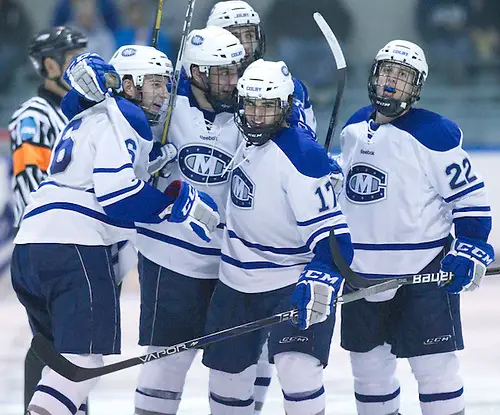In his first year at Colby, coach Blaise MacDonald has taken the reins of a NESCAC team and is learning the ropes in his new conference. Coming from the D-I ranks, MacDonald has coached at Niagara, Massachusetts-Lowell, and BU among other schools before moving on to the D-III ranks and Waterville, Maine this season. The start has been an educational one for the coach, who sees much opportunity for his team in a very competitive conference.
“It is different,” said coach MacDonald. “The NESCAC conference is very competitive and obviously the schools are very academically challenging, so the kids have to really compartmentalize and prioritize their time a little differently than what I have seen at the D-I level. This conference is really competitive, and some teams play some very different systems and alignments that I need to get better attuned to coaching against. Seeing Middlebury and Bowdoin that play with the ‘back’ position and ‘flyer’ in a 3-2 configuration is really different than the more traditional alignments you see at the D-I level. I need to make sure I can best coach to play against those teams to put us in the best position to compete, so there is still some homework to do. There is a whole second half to play.”
When asked if one of the unorthodox or less common systems seen in the NESCAC conference would work or could be implemented at the D-I level, the coach had an interesting response.
“Knowing coaches, I think you would see it if they felt it could work,” said MacDonald. “But there is another factor that really plays in at the D-I level, and that is the professional development people that monitor the progress of their draft picks on the way to the NHL. Say Don Sweeney drafts a kid as a right wing and I have him playing a back or something they may feel is inhibiting his development, it would be a tough situation for the player and coach. Unfortunately, there is more of that developmental aspect of the game at the D-I college level in preparation for the pros, so I think that is why you see such similarities in the game.”
So far this season, Colby has mustered a 2-7-0 record and finished the first half with a 1-5-0 conference record. The lone win came in the final game before finals on the road against Tufts, but the coach is optimistic that the team will show improvement in the second half.
“We have an experienced team learning new things with their third coach in three years,” noted MacDonald. “I think Stan [Moore] and Jimmy [Tortorella] recruited great kids here to Colby, and there is a great hockey tradition here. The team is coming along, but we really haven’t played a complete game yet where we haven’t made some critical mistake that has cost us. We have some lapses in decision-making with the puck and some undisciplined play and penalties that have determined the outcome in some games for our opponents. We have consistently played 40 strong minutes in games, but we still need that consistent focused game for the full 60 minutes and I am confident that the group will have success if we can get there.”
The Mules have lost four games by two goals or less, so they have been very competitive against some teams considered to be among the elite in the conference. MacDonald’s troops have already seen Middlebury, Williams, and Bowdoin twice, so he feels he better understands the best the league has and where his team needs to get to play at that level.
“First of all, the Colby/Bowdoin rivalry is really a great hockey tradition,” stated MacDonald. “I don’t want to see them anytime soon but the atmosphere and alums that come out for those games — wow, it is really amazing. We have seen some really good teams and as the kids get more in tune with what we are trying to do on the ice and I get more used to the styles of play in the league, we are building for success. We are getting there, and with everything these kids have on their plates it is a challenge sometimes to get that prioritized mind share. They are learning as am I, and I am looking forward to see the rest of the league in the second half.”
While the roster is laden with experienced seniors, two juniors have stepped out with their strong play in the first half. Forward Nick Lanza (6-3-9) leads the team in goals and points and is tied for the team lead in power-play goals. Fellow junior Ben Chwick has been the Colby assist king, posting seven helpers in the team’s first nine games this season. While senior Matt Delaney and sophomore Jordan Nathan have received the bulk of the playing time in goal for the Mules, the Tufts win was backstopped by the 38-save performance of sophomore Sam Parker, who earned his first win on the season in the 5-2 decision over Tufts. Parker who stopped 28 of 29 shots over the final two periods, was a key factor in Colby’s win that hopefully will fuel some positive momentum after the break.
The Mules return to action on Jan. 2, 2013 with a nonconference match-up with Salem State of the MASCAC conference at home. Four of their first six games after the break are at home, so maybe the friendly confines of Alfond Arena will bring a better start to the second half than the first. The coach is learning, the team is learning and now, following the break, the lessons must be applied.



